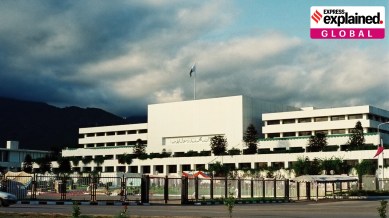Pakistan’s Senate seeks to delay national elections: Here is why
The resolution was passed in the upper house of parliament, when only 15 out of 100 lawmakers were present. What did it say? Have the elections been postponed?

Pakistan’s Senate, the upper house of parliament, passed a resolution on Friday (January 5) seeking to delay national elections that are slated to take place on February 8. Only 15 out of 100 lawmakers were present in the Senate during the session.
Here is a look at the resolution and what could be the impact of delaying the general elections.
What does the resolution say?
The resolution sought to postpone the elections as January and February are the coldest months in a majority of the areas of Balochistan and Khyber Pakhtunkhwa, which could lead to low voter turnout.
Independent Senator Dilawar Khan, who introduced the resolution in the Senate, said various political parties had expressed reservations about facing difficulty in ensuring participation in colder areas during the electoral process, according to a report by Dawn.
The resolution also sought to delay the elections due to security concerns. It noted with “great concern” the recent attempts on the lives of Jamiat Ulema-i-Islam-Fazl (JUI-F) chief Maulana Fazlur Rehman, Member National Assembly leader Mohsin Dawar, and other political leaders.
It said: “The Ministry of Interior has conveyed serious threats to the lives of prominent politicians increasing the challenges faced by political parties in exercising their right to a free and fair election”.
The resolution also cited the increase in the number of attacks on security forces and citizens, particularly in KP and Balochistan. “The intelligence agencies have warned of militant attack threats on election rallies in two provinces,” it added.
Although the resolution doesn’t mention when the elections should take place, Dilawar told Dawn that they could be delayed for an “appropriate time” of “two to four months so the weather improves somewhat”.
So does it mean that general elections have been postponed in Pakistan?
No. The resolution passed by the upper house is non-binding and doesn’t necessarily mean elections will be postponed. The Election Commission of Pakistan has yet to comment on the development.
Leaders from all the major political parties, including Pakistan Muslim League-Nawaz (PML-N), Pakistan Peoples Party (PPP), and Pakistan Tehreek-e-Insaf (PTI), have criticised the resolution.
For instance, PTI’s Barrister Gohar Khan said: “A resolution of 14 senators based on their personal opinions, has no legal or binding force in the constitutional process of holding general elections.”
What could be the impact of delaying elections?
The postponement of general elections could have constitutional, political and economic implications, according to an analysis published by Dawn. One, there is no constitutional ground for delaying the elections. Two, any sort of postponement might exacerbate political instability in Pakistan. Half of the Senate is up for election in March and “if the elections are not held before then, it will leave the country with a truncated Upper House, which is elected by national and provincial assembly members,” the analysis said.
Three, Pakistan needs an elected government with a fresh mandate to “negotiate a larger, longer-term programme with” the IMF to help keep its economy afloat. Without a new programme, the country would exhaust its foreign exchange reserve by June and plunge into economic chaos. Therefore, postponing the elections would pose a huge risk for Pakistan.